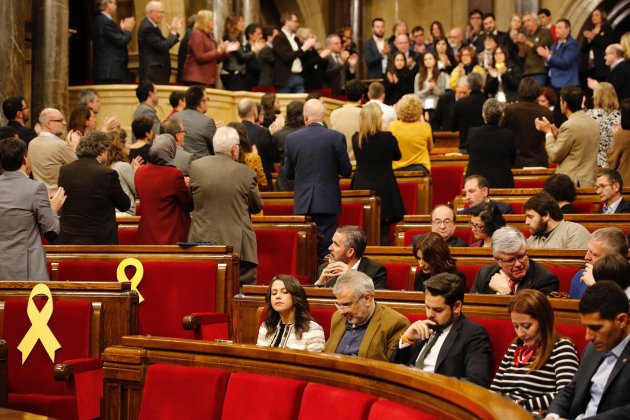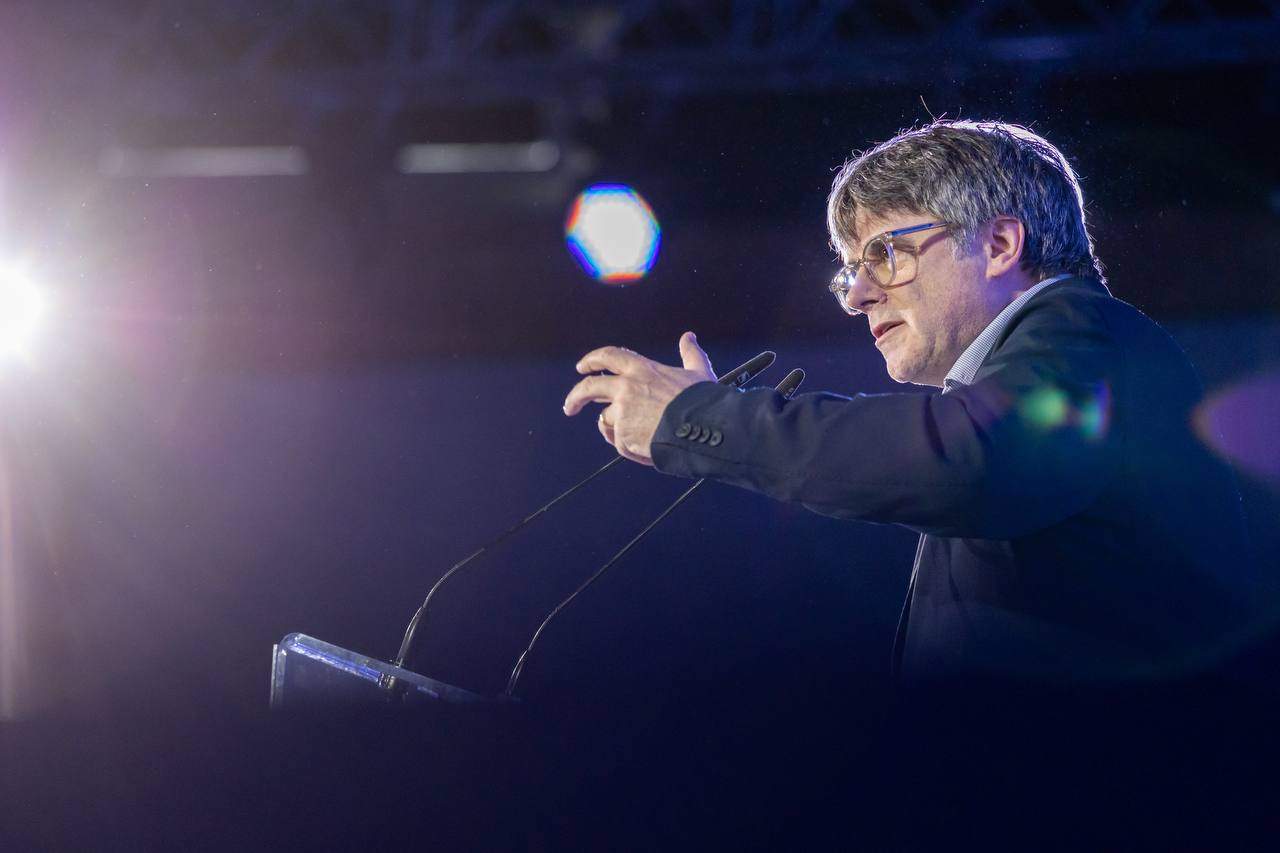It is about 20 minutes by car from his residence at Vallespir to the France-Spain border at La Jonquera, but Carles Puigdemont cannot go to the funeral of his mother, Núria Casamajó, this Wednesday, which is being held in Amer, near Girona, in the middle of the afternoon. This is one of the images of exile. It already happened when Puigdemont's father died, in November 2019, and they had to say goodbye via Skype. But, this time it has happened, moreover, in the middle of the election campaign in which he is the head of the Together for Catalonia (Junts) list and when the president-in-exile is almost within touching distance of a return that should take place in the coming weeks.
Puigdemont was not the only one who had to endure this situation. Exiled culture minister Lluís Puig was in Belgium when his father died on June 19th, 2019 and when, ten months later, he lost his mother. In the case of Toni Comín, his brother decided to go to Belgium to die, in order that he could be accompanied by his whole family, in July 2018; and his mother, Maria Lluïsa Oliveres, also died in Louvain last December when she went to visit him.
Indifference toward Catalan exile
In the midst of the expressions of exaltation - and perplexity - around Pedro Sánchez's strategy to denounce the human difficulties he faces, which has coincided in time with the death of Puigdemont's mother, the dehumanization of exile becomes even more evident for the Catalan independence environment. The alleged blow to the spirit of the Socialist (PSOE) leader after the attacks by the right-wing of Spanish politics and media against his wife, with whom he declares himself deeply in love, has filled huge amounts of journalistic space and television time, but by contrast, the losses and tremendously difficult personal situations experienced by the exiled politicians - who are in exile for having organized a referendum - and whose situations have a harsh impact on their families, have been normalized with cold indifference. By the PSOE, as well.
This indifference to the repression being suffered was one of the accusations that Junts's campaign made, even before Puigdemont had to interrupt his activity. "Where were the Socialists?", asked Puigdemont with indignation on Friday, after speaking of the police violence unleashed against Catalans on October 1st.
Wagensberg: "inhumane"
Ruben Wagensberg, number nine on the Catalan Republican Left (ERC) list for the election to Parliament and exiled in Switzerland for the last six months, also spoke out over the weekend in Geneva, alongside the general secretary of ERC, Marta Rovira, also in exile, who considers it "inhumane and insane" that no one from the Catalan Socialists (PSC) sent him any messages of support; that having been secretary of the Parliamentary Bureau during this legislature, neither the second secretary, the Socialist MP Ferran Pedret, nor the head of the PSC list, Salvador Illa, have contacted him.
And similar questions can also be asked about Sánchez, too: in the last few hours the Spanish PM has listed the personal and family impacts of persecutions such as the one he asserts his family is enduring as a result of defamation campaigns of what he calls the "mudslinging machine", but has not mentioned the dirty war against the Catalan independence movement at any moment. And this despite the fact that, as the sovereignist parties keep on reminding him, the creation of the so-called patriotic police happened at the start of the independence process. The Spanish PM did, however, refer specifically in the interview to he gave on Monday night to public broadcaster TVE, to the harassment suffered by his wife, Begoña Gómez, the campaigns against former Barcelona mayor Ada Colau, and the former deputy PM Carmen Calvo, as well as left-wing political leaders, intellectuals or journalists.
The Spanish PM did not, however, at any time mention the political leaders affected by the independence process, nor the espionage which has targeted them, nor the false news reports, nor the accusations denied by the Swiss banking authorities, which have affected politicians but also the spouses and relatives of politicians like Artur Mas and Xavier Trias and every last member of the Pujol family - and all this despite the fact that the Spanish prime minister has placed the fake news spread by media and parties that "deteriorate democracy" in his sights.

The former political prisoner and general secretary of Junts, Jordi Turull, spoke out about this situation at a meeting in Argelers, hours after Sánchez's speech in the Moncloa palace: "They ask us for empathy? That we have empathy?" With an indignation that was not at all imposed, Turull recalled the tribute that Parliament offered to the family members of the prisoners the day after his imprisonment, and that the PSC turned its back on them. "Where was the humanity of these people? Where are they? They didn'ot want to greet our children, who they turned their backs on, people like Iceta and Espadaler and all that gang! Now they ask us for humanity and empathy? Where were these people? Where were they?" he exclaimed.
Neither do the nine pro-independence leaders, who were all in jail for over three years, forget that their situation was not at all easy. They underline the fact that part of their stay in the penitentiary centres took place under the Socialist mandate - and in the same way, those who were in exile have had to maintain it under almost six years of PSOE government.
The ERC party president, Oriol Junqueras, reminded the Antena 3 network when asked about Pedro Sánchez's reflections and speech on Monday that the prisoners experienced "tremendously difficult" situations and, nevertheless, did not give up. In that interview, he pointed to the situation Puigdemont finds himself in today as "a good example of how inhumane politics can sometimes be" and evoked how even the timing of his imprisonment affected his family. "I remember being jailed on my eldest son's birthday, being taken to testify for the first time on the eve of the Three Kings' holiday and being taken to testify for the second time on my daughter's birthday. If any mathematician wants to calculate the probability of this triple coincidence, it would surely be very interesting," he said.
The images of those family impacts have remained in the memory of all the prisoners. Josep Rull's son was urgently hospitalized on January 5th following an accident he suffered while in Lledoners prison, which left him unconscious; the former Òmnium president Jordi Cuixart was not only separated from a very young son, but also became a father while in prison; in order to be close to her family, ex-speaker of the Catalan Parliament, Carme Forcadell, was imprisoned alone in the Mas d'Enric penitentiary, the same centre which was in the headlines a few weeks ago after a prisoner killed a cook; prisoners' spouses and teenage children had to regularly visit TV studios and speak into microphone at hundreds of events...
The list of family impacts that the Catalan independence movement evokes is almost endless. For the PSOE, that situation was caused by their conviction for crimes which the independence movement rejects as existing. In any case, for Junts and likewise for ERC, the calls for them to show empathy cause perplexity and, during moments like the ones that the president-in-exile is experiencing today, genuine indignation.

